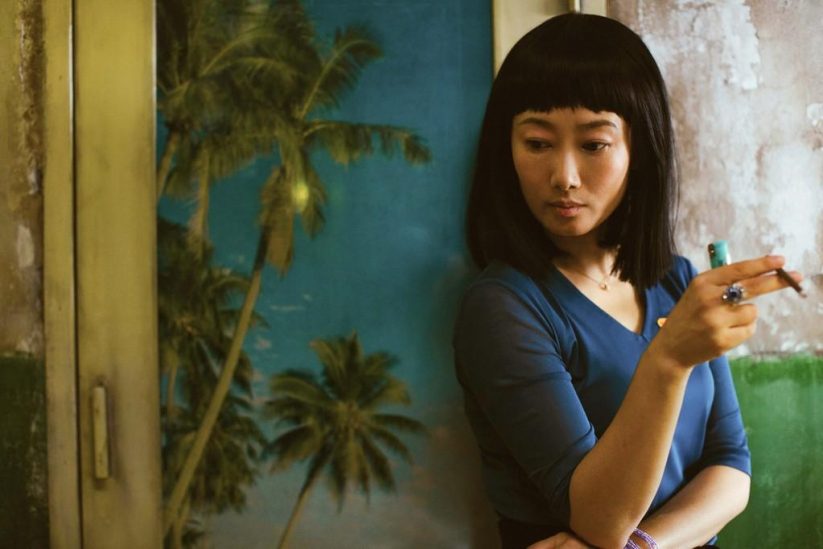London plays host to some of the most exciting Chinese art, dance and cinema, both from mainland China, and its edgy sister Taiwan. Here’s a selection of the best offerings for the Winter season. The common thread throughout is master-craftmanshp: a mind-numbing attention to detail that is intoxicatingly beautiful and unique in its creativity and inventiveness
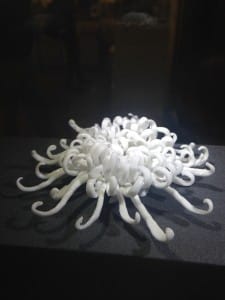 AI WEI WEI until 13 December 2015 | RA London W1
AI WEI WEI until 13 December 2015 | RA London W1
Major artist and cultural phenomenon Ai Weiwei is known for his powerful, provocative and visionary works and is now one of China’s most influential artists and drawing international attention to the Chinese government’s limitations on individual freedom.
Ai became widely known in Britain after his sunflower seeds installation in Tate Modern’s Turbine Hall in 2010 but the RA is now showcasing the first major exhibition in the UK, bridging over two decades of an extraordinary career highlighting Weiwei’s formal attention to detail and to realism, and the calculated whimsy of his creative vision.
Among his newest works are a number of large-scale installations, as well as works in mixed media from marble and steel to tea and glass. With typical boldness, the chosen works explore a multitude of challenging themes, drawing on his own experience to comment on creative freedom, censorship and human rights, as well as examining contemporary Chinese art and society. What emerges here is not only meticulous and mind-numbing attention to detail – Wei Wei’a art also require a dedicated troupe of highly skilled artisans in its painstaking execution. The centrepiece of utter brilliance is a series of limited addition chrysanthemums: delicately rendering in ice-blue, snow-white and shell pink. The refined exquisiteness of these ethereal baubles justifies their price tag of £14,000 per piece.
CHINA NATIONAL OPERA | SADLERS WELLS Theatre | until 22 November 2015
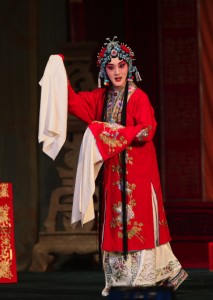 The hot ticket of the decade is CHINA PEKING OPERA‘s visit to the UK this November – The Peking Opera is a unique art form that requires the highest level of performing skill; demanding lifelong dedication to practising its artistry. In this dance and musical extravaganza, each performer trains from a very tender age at opera school before being an apprentice and learning from the masters. With spectacular costumes, face painting make-up and stunning stage craft, Peking Opera represents the essence of tradition Chinese values – achievements come through sweat and tears and resistance to material temptation. If there is an identity and unifying force for Chinese nationals, whether from the mainland, Taiwan or Hong Kong; it is the Peking Opera.
The hot ticket of the decade is CHINA PEKING OPERA‘s visit to the UK this November – The Peking Opera is a unique art form that requires the highest level of performing skill; demanding lifelong dedication to practising its artistry. In this dance and musical extravaganza, each performer trains from a very tender age at opera school before being an apprentice and learning from the masters. With spectacular costumes, face painting make-up and stunning stage craft, Peking Opera represents the essence of tradition Chinese values – achievements come through sweat and tears and resistance to material temptation. If there is an identity and unifying force for Chinese nationals, whether from the mainland, Taiwan or Hong Kong; it is the Peking Opera.
In FAREWELL MY CONCUBINE (ticket details) Zhu Hong gives a unique performance as the lover of the Overlord of Chu, Xiang Yu, who is fighting to save the Qin Dynasty. Floating like an exotic flower, her role culminates in a magnificent sword dance that leaves her as composed as a water lily on a tranquil pond. This combination of controlled emotion and highly complex choreography, echoing Wuxia epics such as The Grandmaster and House of Flying Daggers, is what makes this spectacular an unforgettable experience.
The troupe also perform WARRIOR WOMEN OF YANG, a story set during the Song Dynasty (960AD-1279AD) when the Emperor of Mercy, General Yang Zongbao, leads the Song army against the Western Xia and is victorious thanks to his fierce and loyal female soldiers.
In the climate of a largely westernised China, there are still artists who are passionate about the traditional form of Chinese artistic heritage and devote their lives to preserving the century old form of art. It is a dream kept alive by the National Peking Opera Company who continue to pursuit their dream of keeping this ancient Chinese art form alive and sharing its beauty and stagecraft with the world.
Differing only slightly in costume and makeup, all traditional opera forms, including Peking opera, are, strictly speaking, “regional,” in that each is based on the music and dialect of a specific area. Peking opera assumed its present form about two hundred years ago in Beijing, then the capital of the Qing Dynasty, it is usually regarded as a national art form combining singing, dancing and martial arts. Peking opera is the most representative of all Chinese traditional dramatic art forms.
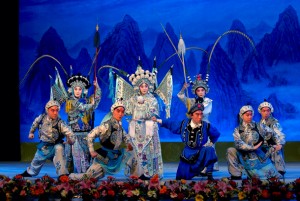 The music of Peking opera is mainly orchestral music and percussion instruments provide a strongly rhythmical accompaniment. The main percussion instruments are gongs and drums of various sizes and shapes. There are also clappers made of hardwood or bamboo. The main stringed instrument is jinghu (Beijing fiddle), supported by erhu (second fiddle). Plucked stringed instruments include yueqin (moonshaped mandolin), pipa (four-stringed lute) and xianzi (three-stringed lute). Occasionally, suona horn and Chinese flute are also used. The orchestra is led by a drummer, who uses bamboo sticks to create very powerful sounds — sometimes loud, sometimes soft, sometimes strong and exciting, sometimes faint and sentimental — and bring out the emotions of the characters in coordination with the acting of the performers.
The music of Peking opera is mainly orchestral music and percussion instruments provide a strongly rhythmical accompaniment. The main percussion instruments are gongs and drums of various sizes and shapes. There are also clappers made of hardwood or bamboo. The main stringed instrument is jinghu (Beijing fiddle), supported by erhu (second fiddle). Plucked stringed instruments include yueqin (moonshaped mandolin), pipa (four-stringed lute) and xianzi (three-stringed lute). Occasionally, suona horn and Chinese flute are also used. The orchestra is led by a drummer, who uses bamboo sticks to create very powerful sounds — sometimes loud, sometimes soft, sometimes strong and exciting, sometimes faint and sentimental — and bring out the emotions of the characters in coordination with the acting of the performers.
The vocal part of Peking opera is both spoken and sung. Spoken dialogue is divided into yunbai (recitative) and jingbai (Beijing colloquial speech), the former employed by serious characters and the latter by young females and clowns. The vocal music consists mainly of erhuang (adapted from folk tunes of Anhui and Hubei) and xipi (from Shaanxi tunes). In addition, Peking opera assimilates the tunes of the much older kunqu opera of the south and some folk arias popular in the north.
The character roles in Peking opera are finely and strictly differentiated into fixed types. Female roles are generally known as dan and male roles as sheng, but male clowns are known as chou. A chou, depicted by a patch of white on the face, is a humorous character. Male characters who are frank and open-minded but rough or those who are crafty and dangerous are known as jing or hualian (painted faces). Peking opera roles are further classified according to the age and personality of the characters. Each different role type has a style and rules of its own. What makes this “opera” unique, is this exotic combination of movement, dance, singing and music that makes it feel literally ‘out of this world’.
CHINESE CINEMA | THE ASSASSIN

Peking opera and its stylistic devices have appeared in many Chinese films. It often was used to signify a unique “Chineseness” in contrast to sense of culture being presented in Japanese films. Fei Mu, a director of the pre-Communist era, used Peking opera in a number of plays, sometimes within “Westernized”, realistic plots. King Hu, a later Chinese film director, used many of the formal norms of Peking opera in his films, such as the parallelism between music, voice, and gesture. In the 1993 film Farewell My Concubine, by Chen Kaige, Peking opera serves as the object of pursuit for the protagonists and a backdrop for their romance. Chen returned to the subject again in 2008 with the Mei Lanfang biopic FOREVER ENTHRALLED. Peking opera is also featured in Peking Opera Blues by Tsui Hark.
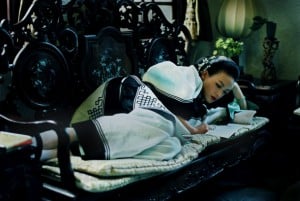 Hou Hsiao-Hsien’s sumptuous films epitomise Chinese cinematic artistry and attention to detail. Fabulously meticulous both in execution and narrative, his award-winning dramas are amongst the most beautiful ever committed to celluloid. Born in Mei County, Guangdong province (China) in 1947, Hou and his family fled the Chinese Civil War to Taiwan the following year where he studied at the National Taiwan Academy of the Arts.
Hou Hsiao-Hsien’s sumptuous films epitomise Chinese cinematic artistry and attention to detail. Fabulously meticulous both in execution and narrative, his award-winning dramas are amongst the most beautiful ever committed to celluloid. Born in Mei County, Guangdong province (China) in 1947, Hou and his family fled the Chinese Civil War to Taiwan the following year where he studied at the National Taiwan Academy of the Arts.
Internationally Hou is known for his austere and aesthetically rigorous dramas dealing with the upheavals of Taiwanese (and occasionally larger Chinese) history of the past century seen through the experience of individuals or small groups of characters. A City of Sadness (1989), features a family caught in conflict between the local Taiwanese and the newly arrived Chinese Nationalist government after the Second World War. Groundbreaking for tackling the controversial February 28 Incident and ensuing White Terror, the film became a major critical and commercial success, winning the Golden Lion at Venice in 1989, making it the first Taiwanese film to win the top prize at the oldest international film festival in the World.
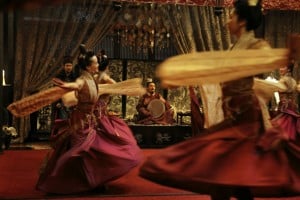 His narratives are elliptical and his style marked by extreme long takes with minimal camera movement but intricate choreography of actors and space within the frame. Hou uses extensive improvisation to arrive at the final shape of his scenes and the low-key, naturalistic acting of his performers. Famous for his rigorous austerity, a close collaboration with cinematographer Mark Lee Ping-Bin since the 1990s has brought a sensual beauty to his to his imagery and this is at its most sublime in his most recent Wuxia outing THE ASSASSIN, which won him Best Director at Cannes this year (2015). Since the 1980s, Chu Tien-Wen has been his writing partner notably on Three Times (2005), The Assassin (2015) and Flowers of Shanghai (1998). He has also cast revered puppeteer Li Tian-lu as an actor in several outings, including The Puppetmaster (1993), based on Li’s life.
His narratives are elliptical and his style marked by extreme long takes with minimal camera movement but intricate choreography of actors and space within the frame. Hou uses extensive improvisation to arrive at the final shape of his scenes and the low-key, naturalistic acting of his performers. Famous for his rigorous austerity, a close collaboration with cinematographer Mark Lee Ping-Bin since the 1990s has brought a sensual beauty to his to his imagery and this is at its most sublime in his most recent Wuxia outing THE ASSASSIN, which won him Best Director at Cannes this year (2015). Since the 1980s, Chu Tien-Wen has been his writing partner notably on Three Times (2005), The Assassin (2015) and Flowers of Shanghai (1998). He has also cast revered puppeteer Li Tian-lu as an actor in several outings, including The Puppetmaster (1993), based on Li’s life.
THE ASSASSIN IS ON RELEASE NATIONWIDE FROM 22 JANUARY 2016
THE CHINA PEKING OPERA | COURTESY OF SINOLINKPRODUCTIONS.COM | SADLERS WELLS 19 -22 NOVEMBER 2015
AI WEI WEI AT THE ROYAL ACADEMY LONDON W1 UNTIL JANUARY 2016
 Dir: Yuen Woo-ping | Action drama | China | 90′
Dir: Yuen Woo-ping | Action drama | China | 90′
